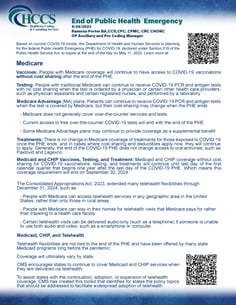Based on current COVID-19 trends, the Department of Health and Human Services is planning for the federal Public Health Emergency (PHE) for COVID-19, declared under Section 319 of the Public Health Service Act, to expire at the end of the day on May 11, 2023. Learn more at: https://www.cms.gov/files/document/what-do-i-need-know-cms-waivers-flexibilities-and-transition-forward-covid-19-public-health.pdf 
Medicare Vaccines: People with Medicare coverage will continue to have access to COVID-19 vaccinations without cost sharing after the end of the PHE. Testing: People with traditional Medicare can continue to receive COVID-19 PCR and antigen tests with no cost sharing when the test is ordered by a physician or certain other health care providers, such as physician assistants and certain registered nurses, and performed by a laboratory
Medicare Advantage (MA) plans- Patients can continue to receive COVID-19 PCR and antigen tests when the test is covered by Medicare, but their cost-sharing may change when the PHE ends. - Medicare does not generally cover over-the-counter services and tests.
- Current access to free over-the-counter COVID-19 tests will end with the end of the PHE
- Some Medicare Advantage plans may continue to provide coverage as a supplemental benefit
Treatments: There is no change in Medicare coverage of treatments for those exposed to COVID-19 once the PHE ends, and in cases where cost sharing and deductibles apply now, they will continue to apply. Generally, the end of the COVID-19 PHE does not change access to oral antivirals, such as Paxlovid and Lagevrio.
Medicaid and CHIP Vaccines, Testing, and Treatment: Medicaid and CHIP coverage without cost sharing for COVID-19 vaccinations, testing, and treatments will continue until last day of the first calendar quarter that begins one year after the last day of the COVID-19 PHE. Which means this coverage requirement will end on September 30, 2024
The Consolidated Appropriations Act, 2023, extended many telehealth flexibilities through December 31, 2024, such as:
- People with Medicare can access telehealth services in any geographic area in the United States, rather than only those in rural areas.
- People with Medicare can stay in their homes for telehealth visits that Medicare pays for rather than traveling to a health care facility.
- Certain telehealth visits can be delivered audio-only (such as a telephone) if someone is unable to use both audio and video, such as a smartphone or computer.
Medicaid, CHIP, and Telehealth
Telehealth flexibilities are not tied to the end of the PHE and have been offered by many state Medicaid programs long before the pandemic. Coverage will ultimately vary by state.
CMS encourages states to continue to cover Medicaid and CHIP services when they are delivered via telehealth. To assist states with the continuation, adoption, or expansion of telehealth coverage, CMS has created this toolkit that identifies for states the policy topics that should be addressed to facilitate widespread adoption of telehealth: https://www.medicaid.gov/medicaid/benefits/downloads/medicaid-chip-telehealth-toolkit-supplement1.pdf


